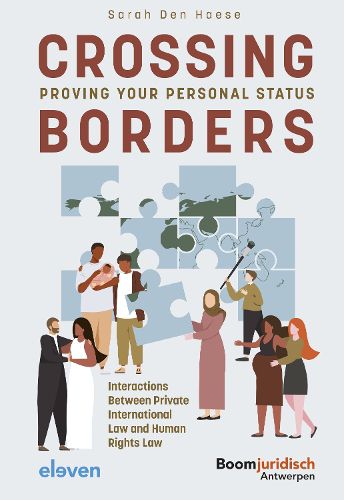Readings Newsletter
Become a Readings Member to make your shopping experience even easier.
Sign in or sign up for free!
You’re not far away from qualifying for FREE standard shipping within Australia
You’ve qualified for FREE standard shipping within Australia
The cart is loading…






This title is printed to order. This book may have been self-published. If so, we cannot guarantee the quality of the content. In the main most books will have gone through the editing process however some may not. We therefore suggest that you be aware of this before ordering this book. If in doubt check either the author or publisher’s details as we are unable to accept any returns unless they are faulty. Please contact us if you have any questions.
The increasing mobility of people leads to the worldwide circulation of documents that record the personal status of people (e.g. birth, marriage, death). The recognition of these documents traditionally belongs to the field of private international law. This book first maps the private international law rules applicable in Belgium and the Netherlands (Chapter 1) and scrutinises whether and to what extent human rights law and EU principles can support people to obtain or prevent the recognition of a personal status obtained abroad (Chapter 2). Legislation, legal doctrine and case law from the European Court of Human Rights (ECtHR) and the Court of Justice of the European Union (CJEU) have been scrutinised in detail. Subsequently, this book looks into the application of this legal framework by Belgian and Dutch public servants and judges when they are confronted with a request to recognise a foreign marriage, legal parent-child relationship or kafala. This book is unique as it encompasses the results of a bilingual online survey distributed among Belgian and Dutch public servants (over 200 respondents) (Chapter 3) and a case law analysis of over 500 published and unpublished judgments (Chapter 4). The last chapter (Chapter 5) contains recommendations and reflects on future research.
Crossing Borders: Proving Your Personal Status is a must-have for practitioners and students looking for a thorough understanding of Belgian and Dutch private international law rules and a comprehensive overview of the ECtHR's and CJEU's case law on the portability of personal status.
$9.00 standard shipping within Australia
FREE standard shipping within Australia for orders over $100.00
Express & International shipping calculated at checkout
This title is printed to order. This book may have been self-published. If so, we cannot guarantee the quality of the content. In the main most books will have gone through the editing process however some may not. We therefore suggest that you be aware of this before ordering this book. If in doubt check either the author or publisher’s details as we are unable to accept any returns unless they are faulty. Please contact us if you have any questions.
The increasing mobility of people leads to the worldwide circulation of documents that record the personal status of people (e.g. birth, marriage, death). The recognition of these documents traditionally belongs to the field of private international law. This book first maps the private international law rules applicable in Belgium and the Netherlands (Chapter 1) and scrutinises whether and to what extent human rights law and EU principles can support people to obtain or prevent the recognition of a personal status obtained abroad (Chapter 2). Legislation, legal doctrine and case law from the European Court of Human Rights (ECtHR) and the Court of Justice of the European Union (CJEU) have been scrutinised in detail. Subsequently, this book looks into the application of this legal framework by Belgian and Dutch public servants and judges when they are confronted with a request to recognise a foreign marriage, legal parent-child relationship or kafala. This book is unique as it encompasses the results of a bilingual online survey distributed among Belgian and Dutch public servants (over 200 respondents) (Chapter 3) and a case law analysis of over 500 published and unpublished judgments (Chapter 4). The last chapter (Chapter 5) contains recommendations and reflects on future research.
Crossing Borders: Proving Your Personal Status is a must-have for practitioners and students looking for a thorough understanding of Belgian and Dutch private international law rules and a comprehensive overview of the ECtHR's and CJEU's case law on the portability of personal status.